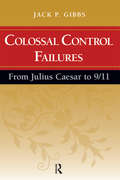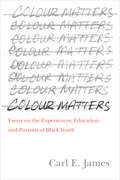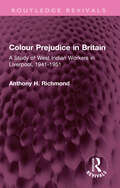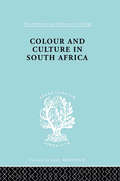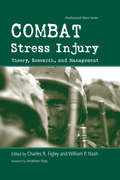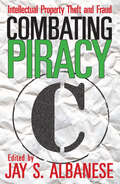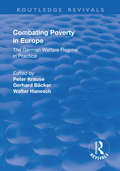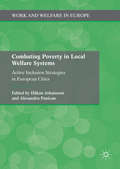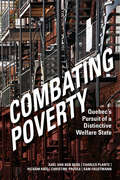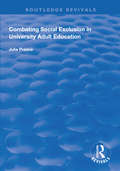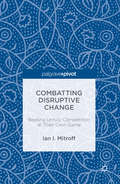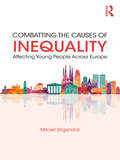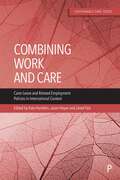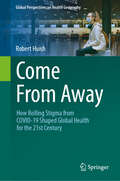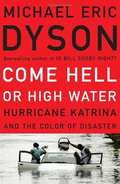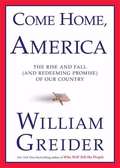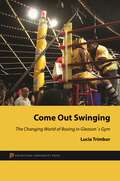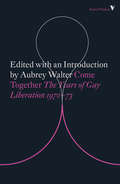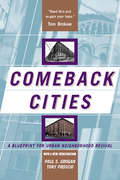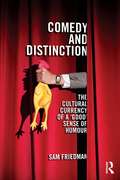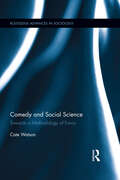- Table View
- List View
Colossal Control Failures: From Julius Caesar to 9/11
by Jack P. GibbsThis fascinating book analyzes 13 control failures in human history, from Robespierre's promotion of the French Revolution, to Hoover's efforts to stop the Great Depression, to the intelligence failures of 9/11. Assessing the causes of 10 additional historical cases, the author's comparative analysis shows how each leadership failure was caused by an expansion of the range of control attempts, their scope, and/or their diversity. A leader's or other actor's attempts to broaden the range of control targets have been most important in causing great human failures. The analysis is timely during an era when war, global warming, and other vexing problems plague our society.
Colour Matters: Essays on the Experiences, Education, and Pursuits of Black Youth
by Carl E. JamesBased on research conducted in Black communities, along with over thirty years of teaching experience, Colour Matters presents a collection of essays that engages educators, youth workers, and policymakers to think about the ways in which race shapes the education, aspirations, and achievements of Black Canadians. Informed by the current socio-political Canadian landscape, Colour Matters covers topics relating to the lives of Black youth, with particular, though not exclusive, attention to young Black men in the Greater Toronto Area. The essays reflect the issues and concerns of the past thirty years, and question what has changed and what has remained the same. Each essay is accompanied by an insightful response from a scholar engaging with topics such as immigration, schooling, athletics, mentorship, and police surveillance. With the perspectives of scholars from the United Kingdom, the United States, and Canada, Colour Matters provides provocative narratives of Black experiences that alert us to what more might be said, or said differently, about the social, cultural, educational, political, and occupational worlds of Black youth in Canada. This book probes the ongoing need to understand, in nuanced and complex ways, the marginalization and racialization of Black youth in a time of growing demands for a societal response to anti-Black racism.
Colour Prejudice in Britain: A Study of West Indian Workers in Liverpool, 1941-1951 (Routledge Revivals)
by Anthony H. RichmondFirst published in 1954, Colour Prejudice in Britain is an account of the assimilation and adjustment of 345 West Indian workers who came to England between 1941 and 1943, many of whom have stayed to the present day. The study endeavours to trace the relationships between this group of West Indians and the English people with whom they came in contact over a period of approximately ten years. It is therefore a study in the two related fields of immigration and racial relations. This book will be of interest to students of sociology, history, and ethnic studies.
Colour and Culture in South Africa (International Library of Sociology)
by Sheila PattersonThis is Volume VI of twenty-one in a series on Race, Class and Social Structure. Originally published in 1953 and using language of the time, this is a study of the status of the Cape coloured people within the social structure of the Union of South Africa.
Combat Stress Injury: Theory, Research, and Management (Psychosocial Stress Series)
by William P. Nash Charles R. FigleyCombat Stress Injury represents a definitive collection of the most current theory, research, and practice in the area of combat and operational stress management, edited by two experts in the field. In this book, Charles Figley and Bill Nash have assembled a wide-ranging group of authors (military / nonmilitary, American / international, combat veterans / trainers, and as diverse as psychiatrists / psychologists / social workers / nurses / clergy / physiologists / military scientists). The chapters in this volume collectively demonstrate that combat stress can effectively be managed through prevention and training prior to combat, stress reduction methods during operations, and desensitization programs immediately following combat exposure.
Combating Piracy: Intellectual Property Theft and Fraud
by AuthorFraud and piracy of products and ideas have become common in the early twenty-first century, as opportunities to commit them expand, and technology makes fraud and piracy easy to carry out. In Combating Piracy: Intellectual Property Theft and Fraud, Jay S. Albanese and his contributors provide new analyses of intellectual property theft and how perpetrators innovate and adapt in response to shifting opportunities.The cases described here illustrate the wide-ranging nature of the activity and the spectrum of persons involved in piracy of intellectual property. Intellectual property theft includes stolen copyrights, trademarks, trade secrets, and patents, which represent the creative work of individuals for which others cannot claim credit. The distributors of books, movies, music, and other forms of intellectual property pay for this right, and those who distribute this work without compensation to its creator effectively hijack or "pirate" that property without the owner's or distributor's permission. The problem has grown to the point where most software in many parts of the world is pirated. The World Health Organization estimates that 10 percent of all pharmaceuticals available worldwide are counterfeit.Such widespread fraud illustrates the global reach of the problem and the need for international remedies that include changed attitudes, public education, increasing the likelihood of apprehension, and reducing available opportunities. The contributors show that piracy is a form of fraud, a form of organized crime, a white-collar crime, a criminal activity with causes we can isolate and prevent, and a global problem. This book examines each of these perspectives to determine how they contribute to our understanding of the issues involved.
Combating Poverty in Europe: The German Welfare Regime in Practice (Studies In Cash And Care)
by Gerhard BäckerTitle first published in 2003. This informative volume addresses the impact of the EU on national policies to combat poverty in European member states. The editors bring together leading academics to discuss the issue of and fight against poverty in Germany in particular, within the context of ongoing trends and debates across other European states.
Combating Poverty in Local Welfare Systems (Work and Welfare in Europe)
by Håkan Johansson Alexandru PanicanThis book analyzes national anti-poverty measures at a local level via a set of unique and up-to-date empirical studies of minimum income support schemes and activation measures in five European cities. In examining this 'local welfare system' approach, it investigates the role that civil society organizations play, and the governance arrangements that prevail in contacts between public and civil society actors in local anti-poverty strategies. The current financial and economic crisis has caused increasing levels of poverty and unemployment, and put national minimum income protection schemes under severe strain. Combating Poverty in Local Welfare Systems therefore represents a timely and important intervention in the political and scientific debates as to whether more 'local welfare' is the solution to the challenges facing European welfare states.
Combating Poverty: Quebec's Pursuit of a Distinctive Welfare State
by Axel van den Berg Charles Plante Hicham Raiq Christine Proulx Sam FaustmannCombating Poverty critically analyses the growing divergence between Quebec and other large Canadian provinces in terms of social and labour market policies and their outcomes over the past several decades. While Canada is routinely classified as a single, homogeneous ‘liberal market’ regime, social and labour market policy falls within provincial jurisdiction resulting in a considerable divergence in policy mixes and outcomes between provinces. This volume offers a detailed survey of social and labour market policies since the early 2000s in Canada’s four largest provinces – Ontario, Quebec, British Columbia, and Alberta – showing the full extent to which Canada’s major provinces have chosen diverging policy paths. Quebec has succeeded in emulating European and even Nordic social democratic levels of poverty for some groups, while poverty rates and patterns in the other provinces remain close to the high levels characteristic of the North American liberal, market-oriented regime. Combating Poverty provides a unique and timely reflection on the political implications and sustainability of Canada’s fragmented welfare state.
Combating Social Exclusion in University Adult Education (Routledge Revivals)
by Julia PreecePublished in 1999, this work suggests that widening participation is not just about changing learner expectations; it is also about changing institutional expectations and practices. "Higher" learning, for example, should include a broader, more inclusive range of knowledge and ways of knowing than at present and criteria for learning achievement should include assessment of "citizenship" as well as linear outcomes.
Combatting Disruptive Change: Beating Unruly Competition at Their Own Game
by Ian I. MitroffThis book is a critical examination of the main ideas regarding disruptive change and startups. It systematically lays out the full set of challenges and tasks one needs to master in order for existing organizations to weather severe change or make a startup successful. Ian Mitroff outlines the protective actions business leaders must take to ensure their continued existence, providing a clear demonstration of the key roles leaders must assume such as Applied Epistemologist, Applied Ethicist, Applied Systems Thinker, Applied Social Psychologist, and Applied Crisis Manager, and how to perform these roles competently. Citing cases such as Facebook, Uber, and Airbnb, this book uniquely analyzes the disrupting agent in emerging industries, which is crucial for success in today's complex and turbulent world. It will be of value to students, academics, and entrepreneurs looking to develop a new product or service.
Combatting the Causes of Inequality Affecting Young People Across Europe
by Mikael StigendalInequality is one of the most burning issues of our time, affecting young people in particular. What causes inequality? And how can actors at the local level combat the causes, not only the symptoms? By seeking to answer these questions, the book will contribute to this growing and transdisciplinary subject area by using mainly qualitative research and a perspective that integrates theory in every phase of the analysis. Drawing on cultural political economy, based on critical realism, the author claims that the most important causes of inequality are the ones inherent as potentials in capitalism and the capitalist type of state. Compared with the first post-war decades, these potential causes have been actualised differently since around 1980. They are also actualised differently across Europe. The book explores these differences concerning growth models and welfare regimes. In general, societies have developed into a new condition of social inclusion, which explains why many young people have become excluded. Societal borders have arisen in the cities, separating the winners and losers of inequality. Positioning itself outside the box of what tends to be the majority of the publications in the field, the book proposes knowledge alliances between young people, policy-makers, civil society and researchers to combat the causes of inequality.
Combining Work and Care: Carer Leave and Related Employment Policies in International Context (Sustainable Care)
by Andreas Hoff Elizabeth Hanson Alison Williams Shingou Ikeda Kate O'Loughlin Tatjana Rakar Maša Filipovič Hrast Valentina Hlebec Anna Ruzik-Sierdzińska Jolanta Perek-Bialas Linnéa Aldman Eva Sennemark Camille Allard Emilia Leinonen Jacquie Eales Katja KnautheAvailable Open Access digitally under CC-BY-NC-ND licence. The proportion of employees with caring responsibilities is growing and, as a result, policies that support working carers are becoming increasingly important. Written and informed by national experts, this is the first publication to provide a detailed examination of the development and implementation of carer leave policies and policies in nine countries across Asia, Oceania, Europe and North America. It compares the origins, content and implications of national policies and practices intended to enable workers to provide care to family members and friends while remaining in paid employment – known as ‘carer leave’.
Come From Away: How Rolling Stigma from COVID-19 Shaped Global Health for the 21st Century (Global Perspectives on Health Geography)
by Robert HuishThis volume takes a deep dive into the lasting legacy of stigma from the COVID-19 Pandemic. Self isolation, quarantine, face masks, hand washing, and travel restrictions are all ancient methods of pandemic management that extend past antiquity. Yet in a highly globalized pandemic, such ancient methods were the front lines of defense for a modern-day pandemic. And with such ancient methods come ancient problems, such as stigma. Based on two-years of extensive research in Nova Scotia, Canada, New Zealand, and Australia (jurisdictions that attempted to achieve Zero COVID) the book carefully outlines how with each wave of the pandemic a new group was blamed for it. When public measures were enforced, often anger was turned to groups who were assumed to have brought the virus into the country (or province). The nature of anger, and the nature of stigma evolved through the pandemic, but the impacts remain. In particular, the pandemic allowed jurisdictions to designate rights, and freedoms for people from certain places, while heavily penalizing others from away. The book argues that COVID-19 was born through globalization but the global response to it was fractured and divisive based on national and territorial identities as is reflected through targeted stigma. If another pandemic is to emerge, the book argues that a commitment to non-stigmatizing methods is needed in order to ensure compassion, dignity and respect, which are the ultimate goals of global health.
Come Hell or High Water: Hurricane Katrina and the Color of Disaster
by Michael Eric DysonCombining a fresh look at the key players in the disaster with his deep knowledge of black migrations and government policy over decades, Dyson provides the historical context that has been sorely missing from public conversation about Hurricane Katrina. He explores the legacy of black suffering in America since slavery and ties its psychic scars to today's crisis, even exploring the agonizing question that came from both survivors and right-wing apologists, "Did God cause Katrina?" His critique of the way black people are framed in the national consciousness will shock and surprise even the most politically savvy reader.
Come Home, America: The Rise and Fall (and Redeeming Promise) of Our Country
by William Greider"The dogmas of the quiet past are inadequate to the stormy present," Abraham Lincoln once declared. "The occasion is piled high with difficulty, and we must rise with the occasion. As our case is new, so must we think anew, and act anew. We must disenthrall ourselves and then we shall save our country." His words are from 1862, when the Civil War was in its second year and already more terrible than expected. I think we are in a roughly similar place, without a great war to focus our energies. The "stormy present" has begun and it will become harsher and more confusing. But if we think anew, we can save the country. Come home, America. Instead of trying to run the world, let us tend our own wounded society. Let go of inflated claims to global dominance. Instead, redeem the fundamental values and sacred principles of the national inheritance. Do not resign from the world. Rejoin it on more practical and promising terms.
Come Out Swinging: The Changing World of Boxing in Gleason's Gym
by Lucia TrimburA nuanced insider's account of everyday life in the last remaining institution of New York's golden age of boxingGleason's Gym is the last remaining institution of New York's Golden Age of boxing. Jake LaMotta, Muhammad Ali, Hector Camacho, Mike Tyson—the alumni of Gleason's are a roster of boxing greats. Founded in the Bronx in 1937, Gleason's moved in the mid-1980s to what has since become one of New York's wealthiest residential areas—Brooklyn's DUMBO. Gleason's has also transformed, opening its doors to new members, particularly women and white-collar men. Come Out Swinging is Lucia Trimbur's nuanced insider's account of a place that was once the domain of poor and working-class men of color but is now shared by rich and poor, male and female, black and white, and young and old.Come Out Swinging chronicles the everyday world of the gym. Its diverse members train, fight, talk, and socialize together. We meet amateurs for whom boxing is a full-time, unpaid job. We get to know the trainers who act as their father figures and mentors. We are introduced to women who empower themselves physically and mentally. And we encounter the male urban professionals who pay handsomely to learn to box, and to access a form of masculinity missing from their office-bound lives. Ultimately, Come Out Swinging reveals how Gleason's meets the needs of a variety of people who, despite their differences, are connected through discipline and sport.
Come Together: Years of Gay Liberation
by Aubrey WalterOn the origins of European queer politicsCome Together tells the incredible story of the emerging radicalism of the Gay Liberation Front, providing a vivid history of the movement, as well as the new ideas and practices it gave rise to across the United Kingdom. Before marriage equality or military service, Come Together reminds us of paths forged but not taken by queer politics in its earliest stages.
Come essere un Minimalista Digitale: Impara i passi necessari su come diventare un minimalista digitale e facilitarti la vita
by Dan GainesStai cercando di semplificarti la vita? Stai cercando di ridurre o eliminare il disordine? Stai cercando di risparmiare denaro? Se hai risposto sì a una di queste domande, questa guida fa per te! Scopri i passaggi essenziali su come utilizzare il minimalismo digitale per semplificarti la vita. Non solo, ma imparerai a: -Risparmia denaro eliminando le spese frivole -Risparmia tempo organizzando la tua vita -Risparmia problemi eliminando il disordine tecnologico -Sii più felice e chiarisci bene le tue idee Questo e altro quando farai clic sul pulsante "Acquista ora" per utilizzare il minimalismo digitale ed avere una vita migliore! Disclaimer: Questo autore e/o il/i proprietario/i dei diritti non fanno rivendicazioni, promesse o garanzie circa l'accuratezza, la completezza o l'adeguatezza dei contenuti di questo libro e declinano espressamente la responsabilità per errori e omissioni nei contenuti all'interno. Questo prodotto è solo per uso di riferimento.
Come into the Water: A Survivor's Story
by Merlyn MagnerRapid City, South Dakota, June 9,1972 . . . 238 people died, 5 are still missing. In the midst of one of the worst floods in the history of the United States, one young woman clung to the roof of a house, desperately holding on to the vestiges of her life. At the same time, the massive flood surging down from the Black Hills and through the city swept away everything and everybody she loved. Somehow, Merlyn Magner survived that horrific night, but she lost her brother, mother, and father to the rampaging water. Questions coursed through her mind then and for much of the rest of her life: Why did this happen? Why did my family die? Why did I survive? What does it all mean? Rescued from that rooftop, Merlyn set out to find the answers to these questions. She searched for comprehension, for a sense of place, for meaning Her search took her from the Black Hills on a journey around the United States and then the world, traversing the globe to escape the memories and the pain. From within this fractured fairy tale, she began a poignant, spiritual journey that would help her make sense of one horrendous night.
Come to the Table: A Celebration of Family Life
by Doris ChristopherIn this helpful and heartfelt book, Doris Christopher shows families how to honor and celebrate one of our most beloved traditions: togetherness around the family table. An American entrepreneur, who is also an enterprising American mom, Christopher serves up a blend of inspiration and practical advice, revealing the ways dozens of others have transformed their tables into vehicles for strengthening family life. Book jacket.
Comeback Cities: A Blueprint For Urban Neighborhood Revival
by Paul S. Grogan Tony ProscioaComeback Cities shows how innovative, pragmatic tactics for ameliorating the nation's urban ills have produced results beyond anyone's expectations, reawakening America's toughest neighborhoods.<P><P> In the past, big government and business working separately were unable to solve the inner city crisis. Today, a blend of public-private partnerships, grassroots nonprofit organizations, and a willingness to experiment characterize what is best among the new approaches to urban problem solving. Pragmatism, not dogma, has produced the charter-school movement and the police's new focus on "quality of life" issues. The new breed of big city mayors has welcomed business back into the city, stressed performance and results at city agencies, downplayed divisive racial politics, and cracked down on symptoms of social disorder. As a consequence, America's inner cities are becoming vital communities once again.
Comedy and Critique: Stand-up Comedy and the Professional Ethos of Laughter
by Daniel R. SmithComedy and Critique explores British professional stand-up comedy in the wake of the Alternative Comedy movement of the late twentieth century, seeing it as an extension of the politics of the New Left: standing up for oneself as anti-racist, feminist and open to a queering of self and social institutions. Daniel Smith demonstrates that the comic sensibility pervading contemporary humour is as much ‘speaking truth to power’ as it is realising one’s position ‘in’ power. The professionalisation of New Left humour offers a challenge to social and cultural critique. Stand-up comedy has made us all sociologists of self, identity and cultural power while also resigning us to a place where a comic sensibility becomes an acknowledgment of the necessity of social change.
Comedy and Distinction: The Cultural Currency of a ‘Good’ Sense of Humour (CRESC)
by Sam FriedmanThis book was shortlisted for the 2015 BSA Philip Abrams Memorial Prize. Comedy is currently enjoying unprecedented growth within the British culture industries. Defying the recent economic downturn, it has exploded into a booming billion-pound industry both on TV and on the live circuit. Despite this, academia has either ignored comedy or focused solely on analysing comedians or comic texts. This scholarship tends to assume that through analysing an artist’s intentions or techniques, we can somehow understand what is and what isn’t funny. But this poses a fundamental question – funny to whom? How can we definitively discern how audiences react to comedy? Comedy and Distinction shifts the focus to provide the first ever empirical examination of British comedy taste. Drawing on a large-scale survey and in-depth interviews carried out at the Edinburgh Festival Fringe, the book explores what types of comedy people like (and dislike), what their preferences reveal about their sense of humour, how comedy taste lubricates everyday interaction, and how issues of social class, gender, ethnicity and geographical location interact with patterns of comic taste. Friedman asks: Are some types of comedy valued higher than others in British society? Does more ‘legitimate’ comedy taste act as a tangible resource in social life – a form of cultural capital? What role does humour play in policing class boundaries in contemporary Britain? This book will be of interest to students and scholars of sociology, social class, social theory, cultural studies and comedy studies.
Comedy and Social Science: Towards a Methodology of Funny (Routledge Advances in Sociology #153)
by Cate WatsonWhile there have been many sociological and psychological studies of humor, few can claim to be funny. Humor may be regarded as a legitimate topic for social scientists, but in general, they present their research rather seriously. In academia, humor tends to be trivialized and dismissed. This is more than just a missed opportunity for otherwise fun-loving academics. In literature, it is readily accepted that comedy is integral to the human condition. To ignore humor is to reject a potentially insightful methodological approach, as the humorous worldview presents unique opportunities for investigating the social. This book constitutes a unique resource, presenting chapters on irony, satire and parody as tools for analysis and means of representation, as well as considering humor in the conduct of research, and offering guidance on getting published. Through presenting examples from across the social sciences, the book seeks to persuade and inspire rather than to prescribe an approach – a closure which would (ironically) be inimical to the multiplicity and ambiguity which characterizes humorous research and lends it its distinctive edge.
